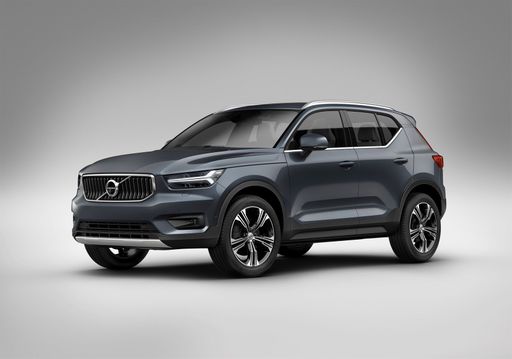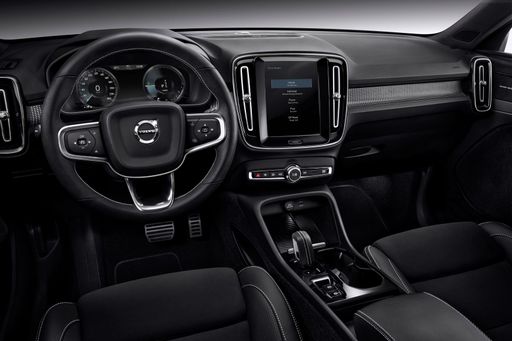Volvo XC40 vs VW Tiguan - Differences and prices compared
Compare performance (197 HP vs 272 HP), boot space and price (36800 £ vs 33300 £ ) at a glance. Find out which car is the better choice for you – Volvo XC40 or VW Tiguan?
Costs and Efficiency:
When it comes to price and running costs, the biggest differences usually appear. This is often where you see which car fits your budget better in the long run.
VW Tiguan has a somewhat advantage in terms of price – it starts at 33300 £ , while the Volvo XC40 costs 36800 £ . That’s a price difference of around 3462 £.
Fuel consumption also shows a difference: VW Tiguan manages with 1.40 L and is therefore convincingly more efficient than the Volvo XC40 with 6.50 L. The difference is about 5.10 L per 100 km.
Engine and Performance:
Power, torque and acceleration say a lot about how a car feels on the road. This is where you see which model delivers more driving dynamics.
When it comes to engine power, the VW Tiguan has a distinct edge – offering 272 HP compared to 197 HP. That’s roughly 75 HP more horsepower.
In acceleration from 0 to 100 km/h, the VW Tiguan is clearly perceptible quicker – completing the sprint in 5.90 s, while the Volvo XC40 takes 7.60 s. That’s about 1.70 s faster.
In terms of top speed, the VW Tiguan performs clearly perceptible better – reaching 242 km/h, while the Volvo XC40 tops out at 180 km/h. The difference is around 62 km/h.
There’s also a difference in torque: VW Tiguan pulls evident stronger with 400 Nm compared to 300 Nm. That’s about 100 Nm difference.
Space and Everyday Use:
Beyond pure performance, interior space and usability matter most in daily life. This is where you see which car is more practical and versatile.
Both vehicles offer seating for 5 people.
In curb weight, VW Tiguan is slight lighter – 1599 kg compared to 1688 kg. The difference is around 89 kg.
In terms of boot space, the VW Tiguan offers clearly perceptible more room – 652 L compared to 452 L. That’s a difference of about 200 L.
In maximum load capacity, the VW Tiguan performs slightly better – up to 1650 L, which is about 322 L more than the Volvo XC40.
When it comes to payload, VW Tiguan barely noticeable takes the win – 533 kg compared to 532 kg. That’s a difference of about 1 kg.
Who comes out on top?
Overall, the VW Tiguan shows itself to be is largely superior and secures the title of DriveDuel Champion.
It convinces with the more balanced overall package and proves to be the more versatile choice for everyday use.

VW Tiguan
Costs and Consumption
View detailed analysis
Engine and Performance
View detailed analysis
Dimensions and Body
View detailed analysis
Volvo XC40
The Volvo XC40 wraps Scandinavian minimalism into a compact, city-ready SUV with a premium cabin that feels both practical and grown-up. It will suit buyers who prize safety, clever storage and a composed ride, proving that small dimensions don't mean small personality.
details




VW Tiguan
The VW Tiguan blends sensible family practicality with a dash of German polish, delivering a calm, reassuring ride and a cabin that never feels like an afterthought. For buyers who want an SUV that’s easy to live with yet still nicely dressed, the Tiguan is the grown‑up choice that keeps a cheeky wink in reserve.
details





Costs and Consumption |
|
|---|---|
|
Price
36800 - 47200 £
|
Price
33300 - 51900 £
|
|
Consumption L/100km
6.50 L
|
Consumption L/100km
1.4 - 8.4 L
|
|
Consumption kWh/100km
-
|
Consumption kWh/100km
-
|
|
Electric Range
-
|
Electric Range
118 - 126 km
|
|
Battery Capacity
-
|
Battery Capacity
19.70 kWh
|
|
co2
147 - 148 g/km
|
co2
32 - 190 g/km
|
|
Fuel tank capacity
54 L
|
Fuel tank capacity
45 - 58 L
|
Dimensions and Body |
|
|---|---|
|
Body Type
SUV
|
Body Type
SUV
|
|
Seats
5
|
Seats
5
|
|
Doors
5
|
Doors
5
|
|
Curb weight
1688 kg
|
Curb weight
1599 - 1890 kg
|
|
Trunk capacity
452 L
|
Trunk capacity
490 - 652 L
|
|
Length
4425 mm
|
Length
4539 mm
|
|
Width
1863 mm
|
Width
1842 - 1859 mm
|
|
Height
1652 mm
|
Height
1656 - 1658 mm
|
|
Max trunk capacity
1328 L
|
Max trunk capacity
1486 - 1650 L
|
|
Payload
532 kg
|
Payload
460 - 533 kg
|
Engine and Performance |
|
|---|---|
|
Engine Type
Petrol MHEV
|
Engine Type
Petrol, Petrol MHEV, Diesel, Plugin Hybrid
|
|
Transmission
Automatic
|
Transmission
Automatic
|
|
Transmission Detail
Dual-Clutch Automatic
|
Transmission Detail
Dual-Clutch Automatic
|
|
Drive Type
Front-Wheel Drive
|
Drive Type
All-Wheel Drive, Front-Wheel Drive
|
|
Power HP
163 - 197 HP
|
Power HP
130 - 272 HP
|
|
Acceleration 0-100km/h
7.6 - 8.6 s
|
Acceleration 0-100km/h
5.9 - 10.6 s
|
|
Max Speed
180 km/h
|
Max Speed
210 - 242 km/h
|
|
Torque
265 - 300 Nm
|
Torque
220 - 400 Nm
|
|
Number of Cylinders
4
|
Number of Cylinders
4
|
|
Power kW
120 - 145 kW
|
Power kW
96 - 200 kW
|
|
Engine capacity
1969 cm3
|
Engine capacity
1498 - 1984 cm3
|
General |
|
|---|---|
|
Model Year
2024
|
Model Year
2024 - 2025
|
|
CO2 Efficiency Class
E
|
CO2 Efficiency Class
G, D, E, F, B
|
|
Brand
Volvo
|
Brand
VW
|
What drive types are available for the Volvo XC40?
The Volvo XC40 is available as Front-Wheel Drive.




